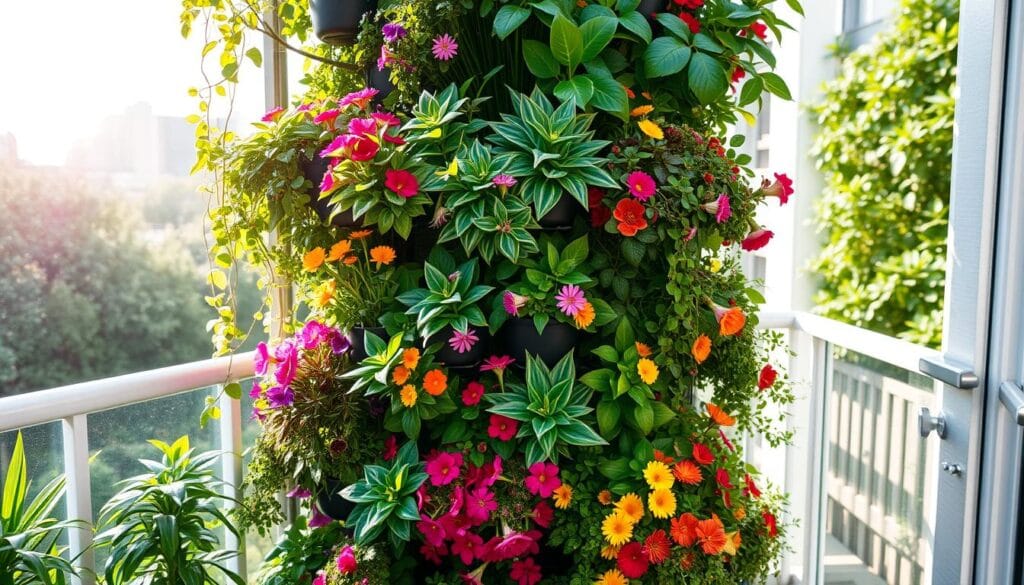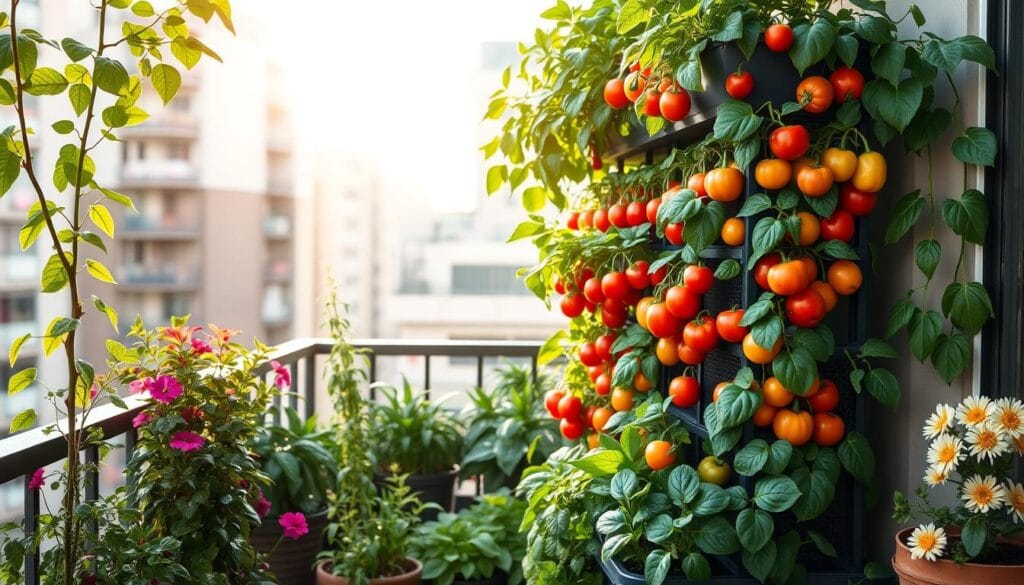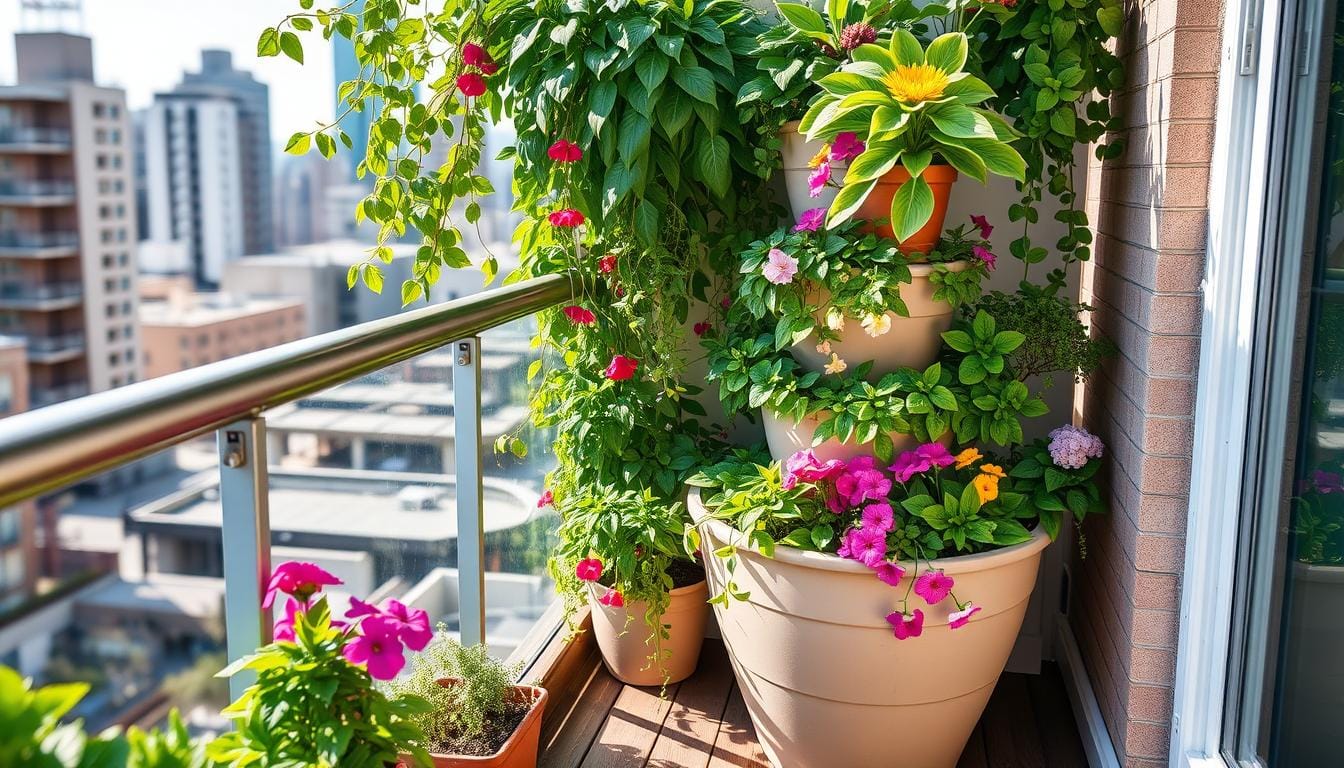DIY tower garden balcony was the solution I found to bring nature’s beauty and calm into my urban life. Living in the city, I’ve always wanted a peaceful, green space. This simple yet innovative project transformed my small balcony into a vibrant, self-grown paradise. With a DIY tower garden, I could maximize the space and cultivate various plants right outside my door, creating a serene urban retreat.
Building a DIY tower garden on your balcony is smart. It makes the most of your space and connects you to nature. By stacking plants at different levels, your balcony becomes a green, vertical wonder. It’s a place where you can grow your own food, smell flowers, and hear leaves rustling. All from your own urban hideaway.
Key Takeaways
- Unlock the potential of limited balcony space with a DIY tower garden
- Create a vibrant, self-sustaining oasis that nourishes the senses
- Enjoy the satisfaction of growing your own fresh produce and herbs
- Transform your balcony into a personal retreat and sanctuary
- Experience the delight of nurturing a flourishing urban garden
Essential Planning and Space Assessment for Your Balcony Garden
Before starting your balcony garden, it’s key to check your space and the environment. This guides you in selecting the right plants and designing your garden. Let’s take a look at the important things to consider.
Understanding Sunlight Exposure and Weight Limitations
Look at how sunlight hits your balcony during the day. Balconies that face south or west receive the most sunlight. Those facing north or east are shadier. This helps you choose the best balcony vegetables, edible gardening plants, and sustainable living options.
Also, think about your balcony’s weight limit. Containers, soil, and plants can be heavy. Ensure that your balcony can support the weight. If unsure, talk to a professional.
Measuring and Mapping Your Available Space
Measure your balcony’s size, including any obstructions. Create a sketch or layout of the space. Note the size, shape, and where you can put your balcony garden elements. This helps you arrange everything well and use your space wisely.
Evaluating Climate Conditions
Think about your local weather and climate. Temperature, rain, and wind can affect your plants. Find out which sustainable living plants do well in your area and plan your garden.
By checking your balcony’s sunlight, weight limit, space, and climate, you’re ready to create a great balcony garden. It will be both beautiful and productive.
| Recommended Components for Balcony Gardening | Quantity |
|---|---|
| Rectangular flower bed containers | 4-5 |
| Thin net for vertical garden foundation | 1 |
| Sturdy hooks for hanging baskets | 2-3 |
| Outdoor pot plant brackets for wall-mounted pots | 2-3 |
| Net for suspending creepers on railings | 1 |
DIY Tower Garden Balcony: Step-by-Step Construction Guide
Turn your balcony into a lush oasis with a DIY tower garden. This method uses vertical space well, letting you grow many plants. It’s great for both new and experienced gardeners, adding joy to your outdoor area.
Choose materials that are light but strong for outdoor use. Use wooden posts for heavy planters or metal/PVC for lighter ones. Old ladders or gutters can make your garden unique.
Design your tower with different levels for various plants. This lets you grow everything from vines to herbs. Make sure it has good drainage and stability for your plants’ health.
Adding an irrigation system or removable pockets makes care easier. These features help with watering and upkeep, making your garden simpler to manage.
“The best garden is made from recycled and repurposed materials,” says Jane Doe, a sustainable gardening expert. “It’s not only eco-friendly, but it also allows you to unleash your creativity and personalize your space.”
With creativity and care, your balcony can become a lush, productive space. Start your vertical farming journey and make your small-space dreams come true.
| Material | Recommendation |
|---|---|
| Wooden Posts | 4×4 or 6×6 lumber for heavier planters |
| Lightweight Containers | Thinner metal or PVC pipes |
| Upcycled Items | Old ladders, gutters, or pipes |
| Drainage and Stability | Crucial for the longevity of your vertical garden |
| Irrigation and Maintenance | Built-in systems and removable planting pockets |
Start your small-space gardening journey and turn your balcony into a thriving DIY tower garden oasis.
Selecting the Perfect Plants for Your Vertical Garden
Turning your balcony into a lush, edible garden starts with the right plants. Choose from heat-tolerant balcony vegetables, fragrant herbs, and vibrant flowers. This mix creates a stunning urban gardening oasis.
Best Vegetables for Tower Gardens
For fresh produce, pick compact and climbing vegetables. These varieties do well in container edible gardening systems:
- Tomatoes
- Peppers
- Cucumbers
- Beans
- Zucchini
Herbs and Leafy Greens That Thrive Vertically
Aromatic herbs and nutritious greens add flavor and color. Top picks include:
- Basil
- Mint
- Rosemary
- Kale
- Lettuce
Flowering Plants for Visual Appeal
Add beauty and fragrance with flowering varieties. Resilient options include:
- Marigolds
- Zinnias
- Petunias
- Nasturtiums
- Trailing Vines
By mixing balcony vegetables, herbs, and flowers, you’ll have a stunning and productive vertical urban gardening oasis.
Smart Container Solutions for Limited Space
Container solutions can change the game for small-space gardening. The right planters can turn your balcony into a lush oasis. You can use hanging pots, vertical planters, or even wooden crates.
Self-watering planters are great for urban gardeners. They keep plants moist without needing to water them often. These planters have reservoirs that slowly release water to the roots.
To make the most of your space, use lightweight materials. Mix different sizes and shapes of containers. This will add interest and fit various plants, from veggies to flowers.
Think vertically to succeed in small-space gardening. Use vertical planters, hanging baskets, and railing containers. This turns your balcony into a lush oasis. With creativity and the right containers, your small space can become a stunning garden.
| Container Type | Advantages | Recommended Plants |
|---|---|---|
| Hanging Pots | Save floor space, add vertical interest | Trailing vines, petunias, fuchsias |
| Vertical Planters | Maximize limited space, create living walls | Herbs, leafy greens, compact vegetables |
| Railing Containers | Utilize overlooked spaces, easy access | Cherry tomatoes, strawberries, cascading flowers |
| Repurposed Items | Unique, cost-effective, eco-friendly | Varied based on container size and shape |
Employ smart containers to convert your small balcony into a thriving urban garden. It can show off your style and love for small-space gardening. Try self-watering planters and get creative to make a true garden oasis in your space.
Installing an Efficient Irrigation System
Turning your balcony into a garden is exciting. But, it’s key to have a good irrigation system for your plants’ health. Smart watering helps save water and makes your garden sustainable.
Water Conservation Tips
Here are some tips to save water:
- Water at the same time every day, like early morning or evening, to cut down on evaporation.
- Water deeply to help plants grow strong roots and need less water.
- Use moisture meters to check soil moisture and avoid too much or too little water.
- Collect rainwater or use greywater from your shower or sink for watering.
Automated Watering Solutions
Automated watering systems make caring for your plants easier. They include drip irrigation or soaker hoses. These systems send water right to the roots, saving water and keeping plants hydrated.
Drainage Management
Good drainage is vital for your balcony garden. Make sure containers and beds have holes to prevent waterlogging. Use materials like terracotta or raised beds to help water drain, keeping your plants healthy.
With these water-saving tips, your balcony garden will thrive. It will be a green oasis where plants grow well and your impact on the environment is small.
Maximizing Vertical Space with Creative Design
Turn your balcony into a lush, vertical oasis with smart vertical farming tricks. Use hanging planters, wall-mounted containers, and trellises to make a stunning DIY tower garden balcony. Vertical gardening lets your urban oasis grow and thrive.
Choose vining plants like ivy, jasmine, or sweet peas to climb up. They add a natural, cascading look to your space. Use modular vertical gardening systems with pockets or shelves for easy changes and a beautiful display. Place your plants at different heights for depth, texture, and better air flow.

Add decorative trellises, arbors, or pergolas for a creative touch. These not only support your plants but also make your balcony garden more interesting. Try different materials, colors, and shapes to match your style and space.
With a bit of creativity and the right vertical farming methods, you can make your balcony a lush, small-space gardening paradise. Let your urban garden grow and flourish with vertical gardening.
Sustainable Gardening Practices for Urban Spaces
The urban gardening movement is growing fast. It’s all about using green practices to make your balcony garden thrive. You can use compact composting and natural pest control to make your garden eco-friendly.
Composting in Small Spaces
Even with little space, you can make rich soil for your garden. Get a small compost bin to turn kitchen waste into fertilizer. This way, you reduce waste and feed your plants well.
Natural Pest Control Methods
Use nature’s help to keep pests away. Plant marigolds with your veggies to repel pests. Also, introduce ladybugs and lacewings to keep your garden balanced.
Organic Fertilizing Solutions
Choose natural fertilizers over synthetic ones. Make compost tea or use worm castings to feed your plants. These options are good for your garden and the planet.
Urban gardeners can make their balconies green and productive. With some creativity and a love for nature, you can grow lots of food, herbs, and flowers. Your garden will make the city a better place.
| Sustainable Gardening Practice | Benefits |
|---|---|
| Composting | – Reduces food waste – Provides nutrient-rich soil for plants – Promotes a circular economy |
| Natural Pest Control | – Eliminates the need for harmful chemicals – Attracts beneficial insects to maintain balance – Enhances the overall health of the garden |
| Organic Fertilizers | – Nourishes plants without synthetic additives – Improves soil structure and fertility – Aligns with sustainable living principles |
“Sustainable urban gardening is not just about growing food – it’s about cultivating a healthier, more resilient community that works in harmony with the natural world.”
Creating a Year-Round Growing Schedule
Take your balcony garden to the next level by planning for year-round harvests. Use smart succession planting and crop rotation to make the most of your space. This way, you’ll have a constant supply of balcony vegetables, edible gardening, and urban gardening treats.
Begin by grouping crops with similar growing times together. This lets you plant quick-growing crops alongside slower ones. It’s a smart way to use your space and keep your produce fresh. Feel free to get creative by planting the same crop at different times to stretch your harvest.
- Use compact, vertical-growing plants like tomatoes, pole beans, and cucumbers to maximize your balcony space.
- Add cold-tolerant greens and root vegetables to keep growing even when it’s cooler.
- Start seeds indoors for longer-growing plants, then move them outside when it’s warm enough.
Adjust your planting schedule based on your local weather and seasons. With some planning, your balcony can become a year-round garden full of edible gardening goodies.

“Regular harvesting can help plants produce more, and using organic fertilizers like compost tea, fish emulsion, and seaweed extract can keep your balcony garden thriving all year long.”
By using smart planting strategies and choosing the right plants, you can have a constant flow of fresh, healthy urban gardening produce. Prepare to savor the fruits (and veggies!) of your hard work all year round.
Incorporating Decorative Elements and Lighting
Turn your DIY tower garden balcony into a stunning oasis. Add decorative elements and lighting to make it cozy and inviting. It’s perfect for your small-space urban garden.
Start with whimsical string lights or hanging pendants. They add a warm glow and become design highlights. Solar-powered lights are easy and green, lighting up your garden at night.
Choose decorative accents that match your plants’ beauty. Use vibrant planters, weatherproof art, or playful touches. Add comfy seating like a bistro set or lounge chairs for relaxing.
Choose materials that can handle the weather. This keeps your decor looking great for years. It’s all about blending looks and function.
With the right decor and lighting, your balcony garden becomes a peaceful retreat. It’s a place for relaxation, inspiration, and enjoying small-space gardening.
“The right plants can provide serene privacy and refreshing shade in any rooftop garden.” 19 Vegetable Container Garden Ideas That Show Off Your Yield
| Design Element | Recommendation |
|---|---|
| Lighting |
|
| Decor |
|
| Material Considerations |
|
Maintenance Tips and Common Challenges
Keeping your balcony garden healthy needs effort and flexibility. Regular pruning helps your plants grow well. Watch out for pests and diseases and treat them with natural methods to keep your garden safe.
Adjust your watering and feeding schedule to match the changing seasons. Use shade cloths or covers to protect your plants from too much sun, wind, or cold.
Rotate your plants to get even sunlight. This stops them from growing unevenly. With some care, your balcony garden will stay lively and fruitful all year.
Addressing Common Challenges
Balcony gardening has its own set of challenges. Finding enough space for all your plants can be hard. Choose small, productive plants and use vertical gardening to make the most of your space.
Wind and bad weather can also be a problem. Place your plants carefully and use barriers to block the wind. Keeping the soil just right is also key for your plants’ health.
| Challenge | Solution |
|---|---|
| Limited space | Use vertical growing techniques, choose compact plant varieties |
| Windy conditions | Strategically place plants, use wind-blocking structures |
| Soil moisture management | Monitor watering needs, prevent waterlogging |
By keeping up with maintenance and solving common problems, your urban garden will flourish year after year.
“The key to a successful balcony garden is adapting your practices to the unique constraints of the space. With a little creativity and persistence, you can create a lush, productive oasis right outside your door.”
Conclusion
The DIY tower garden balcony is a game-changer for city folks. It lets you grow a lush, green space even with little room. You can use vertical gardening, smart watering, and pick the right plants to make your balcony a garden paradise.
This method makes your home look better and helps the planet. It’s great for saving space and water. It’s perfect for those who want to live green and garden in the city.
Starting your own DIY tower garden balcony needs careful planning and upkeep. This guide will help you turn a small spot into a vibrant garden. It will feed your body and soul.

